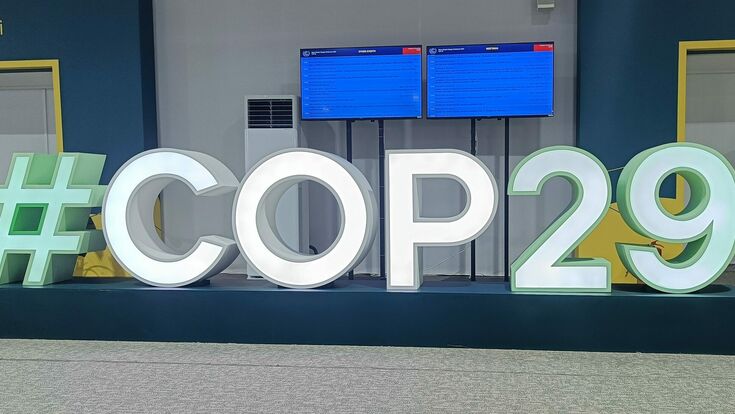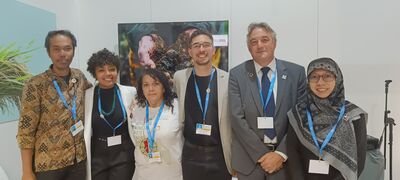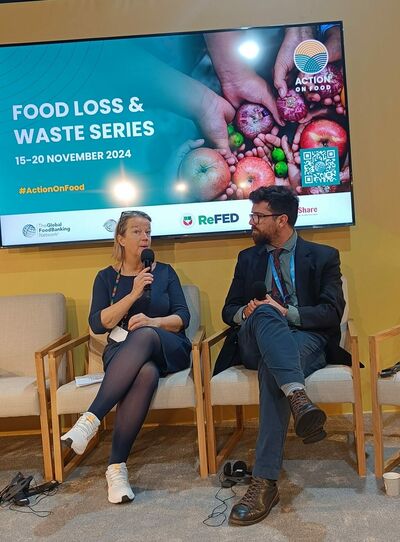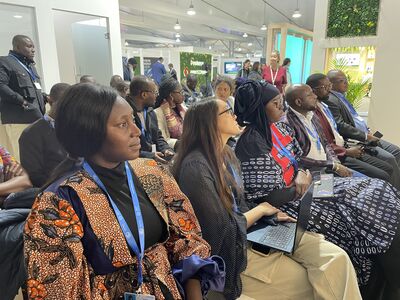COP29 : News from Baku: It’s all about the money

How can we finance measures to mitigate climate change? That is the question stakeholders here at COP29 in Baku are trying to find an answer to. This is also a question that needs to be asked regarding waste management. As you can imagine, there is not one simple solution. Especially when a just transition is thrown into the mix.
As discussed in the session co-hosted by the World Biogas Association (WBA) and the International Solid Waste Association (ISWA) on Wednesday, getting funding for waste management projects is tough. Many are small or medium-sized and therefore not seen as bankable. The capital market likes to make big bets.
“With waste and waste management, everybody says go big. But we say we think big in going small”, said Christina Jäger, Co-Founder and Managing Director of the Yunus Environment Hub, at a session at ISWA’s Waste and Resource Pavilion on Thursday, where experts discussed the importance of social businesses as a driver for a just circular economy transition. Decentralised, creative solutions that take into consideration the local conditions, the panellists, including ISWA president James Law, Lara van Druten, CEO of The Waste Transformers, and Alex Wang, Managing Director of the Global Committee on Social Business for SDGs, agreed are very often what is needed to solve the waste problem. But, unfortunately, they are undervalued. “Policymakers, investors and banks need to start to think creatively and see waste as a valuable resource”, Christina Jäger said. “With social businesses the chances of failing are high, but you need to try”, Lara van Druten added. Her company, The Waste Transformers, gives local entrepreneurs the tools and the business model to be able to make a living from treating waste. They cut out the cost of transportation and land by processing the waste on-site.
Related article: Putting Waste on the COP29 Agenda
Policymakers, investors and banks need to start to think creatively and see waste as a valuable resource.Christina Jäger, Yunus Environment Hub
The lack of access to public funding and financing, as well as the necessity to create additional revenue from treating waste, was also discussed at the Global Methane Action Hub (GMH) Pavilion. Victor Argentino from Instituto Pólis and Fictor Ferdinand of YPBB (Yaksa Pelestari Bumi Berkelanjutan) presented community-based composting projects in Brazil and Indonesia, respectively. The additional revenue comes from selling compost as well as, in the case of the project in Indonesia, from selling the larvae of the Black Soldier Fly, which first help in the degradation process of the biowaste as a food product.
Get waste management in the NDCs
Money is not only needed to get projects off the ground but also to improve the conditions of the waste workers – both informal and formal. The first step would be to recognise what waste workers do, to create decent working conditions and formalise jobs, as Christina Jäger put it.
Waste workers also need a seat at the table, Soledad Vidal of the National Association of Waste Pickers of Chile (ANARCH), representing the 20 million waste pickers worldwide, said at the GMH Pavilion: "Waste pickers are providing a service but they are not valued. We have a voice and we finally are visible. Still, at this COP there is only one waste picker and that is me. That has to change."

“Financing for waste management – in general – is too low,” said ISWA’s Peter Simoes, who took part in the discussion at the GMH Pavilion. “Nevertheless, organic waste management is crucial in reducing methane emissions. And if you spend one dollar on waste management, you get much more than in other sectors.” The technology is already there, the effect would be immediate.
An important step would be to include waste management in the National Determined Contributions (NDCs). “Then governments need to make sure there is funding”, Simoes argued.
Waste pickers are providing a service but they are not valued. We have a voice and we finally are visible. Still, at this COP there is only one waste picker and that is me. That has to change.Soledad Vidal of the National Association of Waste Pickers of Chile
This is one of the key messages that comes up in almost every discussion on waste and waste management at COP29 and as a call out to governments: Please incorporate waste management in the NDCs.
Led by Chile, many Latin American countries such as Mexico, Panama and Uruguay champion a call to action to do just that, as Andres Pirazzoli, CEO of Resilum, revealed during a session at the Action on Food Hub Pavilion. “For our countries, it’s not only about climate. Health, food security, odours, quality of life – those are important aspects as well!
As others fighting to put waste on the climate agenda he is elated about the COP29 Presidency’s Declaration on Reducing Methane from Organic Waste. “Politically speaking this is important. And those are low-hanging fruits: improvement of collection, composting – this is all not hard to do.” Food loss and waste are a key area to tackle since they make up 8-10% of global GHG emissions. But what is lacking is – of course – the funding.
“From ISWA’s side, we are first and foremost happy that waste finally is mentioned in a Presidency Declaration,” said Anja Schwetje, Vice-Chair of ISWA’s Working Group on Climate Change and Waste Management at the same event. “Moreover, it is good to see that the declaration not only focuses on the mitigation of methane but includes waste management, soil remediation and food loss. This allows us to draw the line between climate mitigation and food loss. It is an emphasis on prevention and treating biowaste.” ISWA hopes that many countries endorse it.

ISWAs African Partner’s ambitious projects
The NDCs were also a big topic at a session at the Waste and Resources Pavilion. The ISWA members from Ghana, Senegal, and South Africa highlighted their ambitions and achievements in the waste sector, leveraging climate finance mechanisms, such as those outlined in Article 6 of the Paris Agreement, to support methane mitigation and the implementation of their NDCs. Present where Fanta Diop, Project portfolio manager, Sonaged SA, Senegal, Fiifi Boadi, Lead, Sustainability and Resilience Unit, Ministry of Sanitation and Water Resources, Ghana, and Co-Chair of the Biogas Subcommittee of Global Methane Initiative (GMI), Dr Glenn Gyimah, General Manager of Jospong Green Transition Office, Jospong Group of Companies / Zoomlion, Ghana and Kgauta Mokoena, Chief Director, Chemicals and Waste Policy Specialist Monitoring Services, Department of Forestry, Fisheries and the Environment, South Africa.
From a gender perspective, it was encouraging to see how many women were in the audience, sharing their experiences and work in the waste sector.


